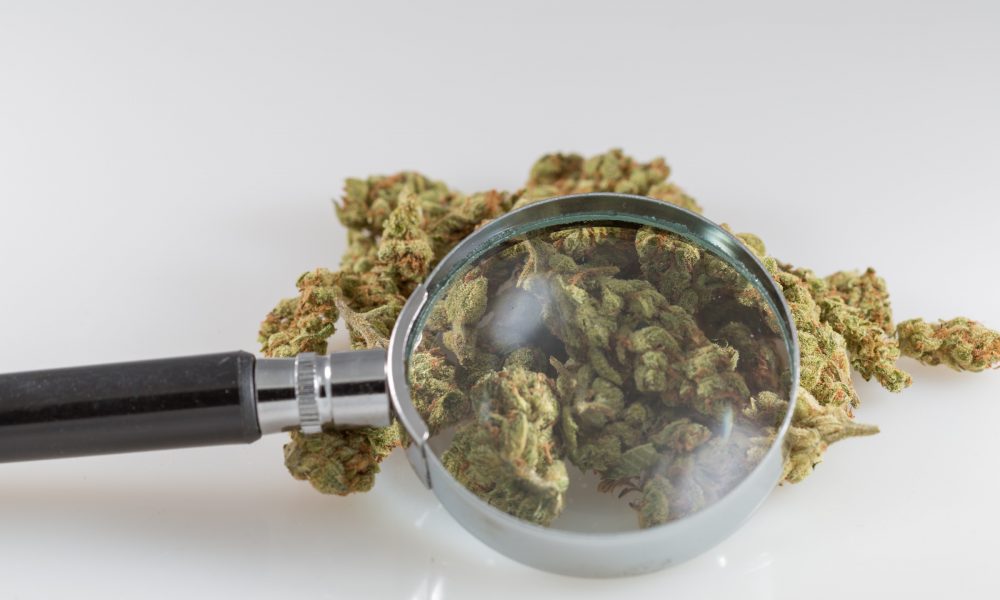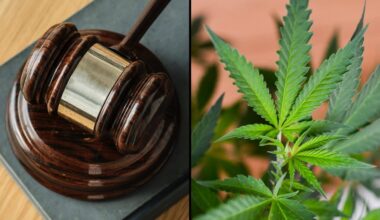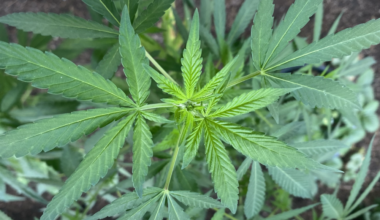A key Maryland House committee on Friday approved a pair of bills to put a marijuana legalization referendum on the November ballot and begin setting up details for the program if voters approve.
Both measures are being sponsored by Del. Luke Clippinger (D), who chairs the House Judiciary Committee that approved the measures. Del. Robbyn Lewis (D) said that the proposals are expected to be taken up on the floor “next week.”
More hopeful news from the Maryland House of Delegates: the Judiciary Committee voted out bills to legalize adult recreational use of cannabis. Bills should come to the floor next week. I look forward to voting yes. #LegalizeIt #MDGA22 #Working4MD https://t.co/5NDILzJW8r
— Del. Robbyn Lewis (@RobbynLewis46th) February 18, 2022
Clippinger’s two proposals are relatively straightforward. The first, HB 1, would ask voters to approve an amendment to the state’s constitution to legalize cannabis use and possession by adults at least 21 years old. It would further direct lawmakers to set laws to “provide for the use, distribution, regulation, and taxation of cannabis within the state.”
It was approved in a 14-6 vote.
The second measure, HB 837, is designed to get started on that work. It specifies that the purchase and possession of up to 1.5 ounces of cannabis would be legal for adults, and it would remove criminal penalties for possession of up to 2.5 ounces. Past convictions for conduct made legal under the proposed law would be automatically expunged, and people currently serving time for such offenses would be eligible for resentencing.
That measure passed in a 15-5 vote.
Several amendments to that bill were adopted by the panel on Thursday and Friday, including allowing adults 21 and older to grow up to two plants for personal use, gift cannabis to other adults and reduce the time before a person with a marijuana conviction is eligible for automatic expungement from four to three years.
The committee also approved amendments to reduce the penalty for public consumption and legalize cannabis paraphernalia. Meanwhile, a proposed revision to provide gun rights protections for cannabis consumers under state law was rejected, with members expressing concern about a potential federal policy conflict.
“We’re grateful to Maryland’s legislative leaders for prioritizing cannabis legalization and are encouraged by the amendments made in House Judiciary to expand legalized conduct,” Karen O’Keefe, director of state policies for the Marijuana Policy Project, told Marijuana Moment.
These latest developments come days after committee members held an extensive discussion about the reform proposals.
The bill as drafted would further establish a Cannabis Business Assistance Fund to support equity initiatives for minority- and women-owned businesses. That fund would go toward incubator and educational programs to promote participation in the industry by people most impacted by criminalization.
To study the effects of legalization on the state and its residents, the new statutory bill would also establish various studies, including into youth impacts, use patterns, impaired driving, advertising, labeling, quality control of products and barriers to entering the industry. A baseline study would be conducted before legalization, and updates would be sent to the governor every two months.
The Maryland bill would start by making possession of small amounts of cannabis a civil offense on January 1, 2023, punishable by a $250 fine, with legalization not kicking in for another six months. That’s a problematic timeline, as far as advocates are concerned.
HB 1 (the Constitutional amendment for adult use and possession of cannabis) and HB 837 (cannabis reform) have passed out of the Judiciary Committee. Our work now heads to the House floor. Thank you to @SpeakerAJones & members of our workgroup for your leadership on this issue.
— Luke Clippinger (@LukeClippinger) February 18, 2022
“We appreciate Chair Clippinger and the committee’s work to allow adult sharing, limited home cultivation, and to ensure edibles and paraphernalia are included,” MPP’s O’Keefe said. “We look forward to continuing to work with both chambers, including to address a gap between the referendum’s passage and legalization that could lead to demeaning and potentially violent police-civilian interactions.”
Meanwhile, there are at least three other competing legalization bills that have been filed in the state legislature this session.
On the Senate side, meanwhile, Sen. Brian J. Feldman (D) earlier this month introduced SB 833, which would also ask voters to approve a constitutional amendment legalizing cannabis for adults. That measure, like Clippinger’s plan, would go to voters in November and take effect in July 2023.
Feldman’s 83-page bill would allow home cultivation of up to four plants per adult, with a maximum of eight plants per residence. It would also package the constitutional amendment and basic regulatory framework in a single piece of legislation, unlike Clippinger’s bifurcated package.
Feldman was a lead author on a separate legalization measure last year that was co-sponsored by Senate President Bill Ferguson (D).
Ferguson, for his part, said last year that he favored legalizing cannabis through the legislature rather than waiting to ask voters on November’s ballot.
Another Senate bill in play this session, SB 692, from Sen. Jill Carter (D), would set higher possession amounts of up to four ounces of marijuana and would allow home cultivation of up to six cannabis plants. Possession in excess of those limits would carry no more than a $150 fine, and past criminal records would be cleared for certain cannabis-related charges.
Both Senate bills are set to be discussed March 3 in the Senate Finance Committee.
A competing legalization bill on the House side, HB 1342, was introduced earlier this month by Del. Gabriel Acevero (D).
—
Marijuana Moment is already tracking more than 1,000 cannabis, psychedelics and drug policy bills in state legislatures and Congress this year. Patreon supporters pledging at least $25/month get access to our interactive maps, charts and hearing calendar so they don’t miss any developments.![]()
Learn more about our marijuana bill tracker and become a supporter on Patreon to get access.
—
Legalization began to advance through Maryland’s legislature last session, but no votes were ultimately held. The Senate Finance Committee held a hearing last March on a legalization bill sponsored by Feldman and Ferguson. That followed a House Judiciary Committee hearing on a separate cannabis proposal in February.
Lawmakers then worked to reconcile the differences between the House and Senate proposals in hopes of getting something to the desk of Gov. Larry Hogan (R). Hogan has not endorsed legalization but has signaled he may be open to considering the idea.
A poll in October found that the state’s residents are on board with the policy change. Two-thirds (67 percent) of Marylanders now back legalizing cannabis, according to a Goucher College survey. Just 28 percent are opposed.
Maryland legalized medical marijuana through an act of the legislature in 2012. Two years later, a decriminalization law took effect that replaced criminal penalties for possession of less than 10 grams with a civil fine of $100 to $500. Since then, however, a number of efforts to further marijuana reform have fallen short.
A bill to expand the decriminalization possession threshold to an ounce passed the House in 2020 but was never taken up in the Senate.
Also that year, the governor vetoed a bill that would have shielded people with low-level cannabis convictions from having their records publicized on a state database. In a veto statement, he said it was because lawmakers failed to pass a separate, non-cannabis measure aimed at addressing violent crime.
In 2017, Hogan declined to respond to a question about whether voters should be able to decide the issue, but by mid-2018 he had signed a bill to expand the state’s medical marijuana system and said full legalization was worth considering: “At this point, I think it’s worth taking a look at,” he said at the time.
As for Maryland lawmakers, a House committee in 2019 held hearings on two bills that would have legalized marijuana. While those proposals didn’t pass, they encouraged many hesitant lawmakers to begin seriously considering the change.
Read the full text of amendments approved by the committee below:
New York Assembly Leader Launches PAC That Will Support Pro-Marijuana Reform Candidates
Medical Disclaimer:
The information provided in these blog posts is intended for general informational and educational purposes only. It is not a substitute for professional medical advice, diagnosis, or treatment. Always seek the advice of your physician or other qualified healthcare provider with any questions you may have regarding a medical condition. The use of any information provided in these blog posts is solely at your own risk. The authors and the website do not recommend or endorse any specific products, treatments, or procedures mentioned. Reliance on any information in these blog posts is solely at your own discretion.






